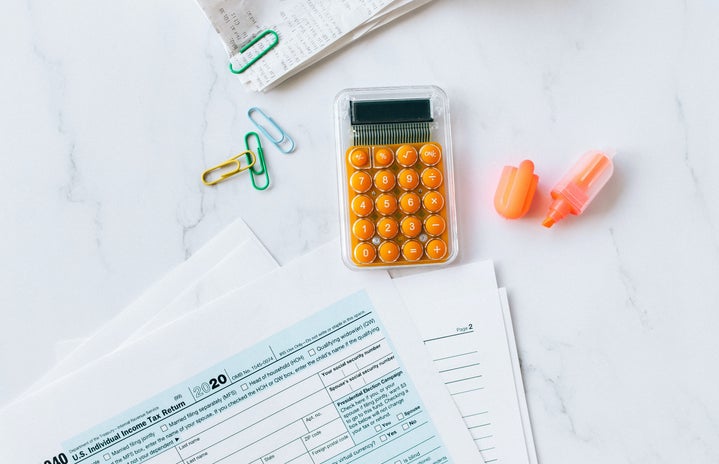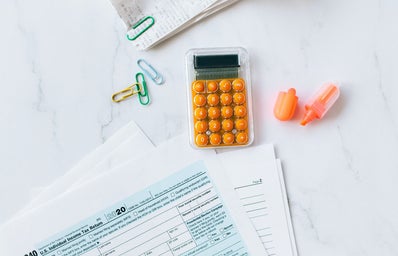It’s that time of year again: tax season. It’s the time of year where you stress about how to fill out your tax forms, stress about whether or not you get a refund, and then stress about what to do with it once you get it.
If you haven’t filed your taxes yet, don’t worry! You still have a little bit of time. The IRS has officially extended the filing deadline for individuals to May 17.
If you’ve filed your taxes and know that you’re getting a refund, you may be wondering what to do with it. And, while it may be tempting to immediately go on a shopping spree, I urge you to carefully think about how you can use this money to help you. In fact, I’ve curated a list of six tips for making the most of your tax return this year based on tips I’ve heard in the past and advice I’ve received from people with way more experience. If you’re struggling with choosing how to budget out and spend your tax return, these five suggestions will help.
- Pay down any high-interest debt
-
Whether you’re a college grad with a mountain of student loans or someone with three credit cards worth of debt, using your tax return to pay off some of that debt (if not all) is a good move.
“If you receive a significant refund, but you also have high-interest debt dragging you down, resist the urge to splurge,” says Michael Benninger, banking writer for Finder. “Instead, use the influx of cash to pay off some or all of what you owe, and you’ll thank yourself in the end.”
Benninger adds that financial freedom can be far more rewarding than the fleeting thrill of buying unnecessary items. I can confirm that.
When I got my tax return, it included the stimulus checks from 2020 that I was unable to receive due to how I filed my taxes for 2019. This meant that I had that money in addition to the money I had overpaid in taxes over the course of the year. Almost all of it went to my credit card in order to get it paid off.
Having to spend that much money to pay off my credit card hurt a little bit, but it felt amazing to see the zero dollar balance on my statement. I also saved myself so much money in interest by paying it off now, instead of putting it off for a couple more months with double or even triple the minimum payment.
If you find yourself struggling with a lot of debt and no idea how to begin paying it off (even with your stimulus and tax return money), you have a couple of options. You can opt for the snowball method, which is where you put your immediate focus on paying off the smaller debts. With this method, you’re able to trick your brain into feeling motivated once you’ve cleared a balance.
The other option to pay back debt is by the avalanche method. This method focuses on your debts with higher interest. This is typically the method I use because I absolutely despise interest and I find that I don’t always have the extra money to put towards that debt. Take time to write down everything all your debts and note the interest rates for each once. Once you know which debt has the highest interest rate, you’re going to want to put the extra money towards that once.
Ultimately, the direction you choose to pay off your debts is based on your own financial situation. Maybe all of your debt has the same interest rate, or maybe you’re paying back an interest-free purchase right now. You just have to really look at what you’re working with and go from there.
Added bonus if you have a high usage rate: paying off your credit card can also help you bring that utilization rate down and, in return, increase your credit score. It’s a win-win.
- Get up-to-date on your bills or start creating sinking funds
-
It goes without saying, but making sure bills are paid is an absolute necessity of life. If your bills aren’t paid, everything can crumble into chaos. Once you get your expected refund amount and it’s approved, sit down to budget it out. If your bills are all caught up and paid for, fantastic! That means you can use your tax return for anything else you want.
However, if you still owe some money on your bills, you may want to consider using part of that return to get back on track (and no judgement if you’re behind; the pandemic has left a lot of people in turmoil). Some people prefer to use their paychecks for bills, though, and that’s fine, too! Do whatever works for you.
Another suggestion for your tax return in terms of bills is to use some of that money to create what Tana Williams, founder of DebtFreeForties.com, calls “sinking funds.”
“Sinking funds are those non-monthly costs that are irregular, like car maintenance, water/garbage/sewer bills, once a year HOA fee, school activities fees, or your vacation fund,” Williams says. “They don’t happen every month, but you know they’re out there and will pop up eventually.”
You can also create a sinking fund for something you want to purchase or do but can’t bring yourself to immediately drop the money on. Put away a third of the cost into a “sinking fund” and then continue contributing a little money to the fund until you can afford the item or activity.
- Start saving for an emergency fund
-
One of the biggest pieces of advice that I’ve seen regarding money and finances is to make sure that you have an emergency fund made. Costly expenses pop up out of nowhere, so it’s important to be prepared.
“Instead of thinking about what you can buy with your tax refund, open up an emergency fund,” Paul Sundin, CPA & Tax Strategist at Emparion, says. “You will have many more unexpected expenses, and it is best to prepare for these rather than rely on your credit card or a loan that you can’t afford.”
Sundin goes on to say that you should be working to have at least three to six month’s worth of emergency funds for any medical emergencies and home or car repairs. Keep your fur babies in mind, too. About a year ago I had to use my credit card for a sudden mouth surgery for my cat of about ten years. I wasn’t financially prepared for it, so it kept me in credit card debt up until recently.
Another piece of advice that may be helpful in encouraging you to save up some money is to name these emergency fund accounts for things that may pop up. You can name one for medical expenses, car expenses, or even home renovations.
Greg Klingler, Director of Wealth Management at the Government Employees’ Benefit Association, says that “personalizing [or] naming the fund can help motivate you to contribute to it and resist the temptation to withdraw from it.”
- Put a down payment on a car or apartment/house
-
When I was at work one day, a coworker mentioned using their stimulus money to put a down payment on a car and it made me think about how if I were in a different financial position, using my tax return and stimulus money to put a down payment on a car would be a brilliant idea.
I don’t have a car or an apartment of my own, but I did help my sister get a car and she needed about $1,000 down to get approved for her car loan. Now, you may not be getting that much in your tax return, but if you’re serious about getting a car you could combine that money with your stimulus money to make it happen. You should also think about whether buying or leasing is the best option for you; it’s up to you to get the best value for your money.
Though COVID-19 continues to put a halt on most people’s plans to move into their own apartments and get their dream jobs, you can still use this money to put aside for the security deposit and first month’s rent on that apartment you hope to get later on. Get yourself prepared for life after the pandemic when you can afford to live on your own and get the job you want.
Also, a huge disclaimer: this piece of advice is very specific to those of you who were already looking to purchase a new car or start renting an apartment. Please do not put a down payment on something you can’t afford long-term. If your financial situation doesn’t allow you to make the monthly payments, skip this option for your tax return money completely or simply set the money aside in a high yield savings account.
- Invest in your passion project
-
For most of you, any amount of money from your tax return is going to go to debt, bills, or an emergency fund. This is especially true after the year we’ve all had in 2020. However, this is also a time to invest any extra funds you have into that passion project, side hustle, or small business you’ve been thinking about starting.
Rebecca Lake, personal finance expert and owner of Boss Single Mama, says that she would rather invest in a passion project than use tax return money to pay off debt or build emergency savings. Lake says that while those are great options, investing in that online business you want may be an even better option.
“I started a freelance writing side hustle almost a decade ago,” Lake says. “I spent money on a good quality laptop to do it. And that investment has paid off because I now have a business that makes multiple six figures a year.”
Lake was even able to keep her business going through the pandemic.
Your investment doesn’t have to be in copywriting or involve buying a new laptop. You can also invest in gear to start that podcast you always wanted to! Or, if you have a few online courses that you’ve been wanting to take but couldn’t afford, now’s your chance.
Lake’s main advice is to use this money to invest in yourself. If you find yourself in a hard financial place, though, use it to cover your necessities. Don’t forget: making sure you have a roof over your head and food to eat is investing in yourself, too.
- Invest some of that money in stocks or in a retirement fund
-
Investing in stocks is not something I’m well-versed in, nor do I have any intention of doing so until I understand it, but it is something that multiple people suggest you do.
“Due to so much ‘free money’ floating around in the system, now is an ideal time to invest in equities, commodities, real estate, [or even] cryptocurrencies,” says Adem Selita, CEO & co-founder of The Debt Relief Company in New York.
Investing money into other companies gives you the chance to earn even more money to put back into your pocket when you sell the stock back.
You may also want to consider opening an Independent Retirement Account (IRA), which would allow you to deduct even more from your taxes next year and put more money in your pocket. If you contribute to this account throughout the year, you’re able to claim it on your taxes and it will directly decrease your taxable income.
It goes without saying that these suggestions are entirely dependent on how much your refund is and if you got one at all. However, these tips can also be applied to how you utilize your stimulus checks. Prioritize your bills and necessities first. It’s not fun, and certainly not glamorous, but in a time of trial and uncertainty, it’s important to make sure you and your family are taken care of.
At the end of the day, this is a list of curated tips to help you make the most of your money (and to figure out what that means to you). Only you know your financial situation and can make the best choice for you.
Follow Katie on Twitter.


